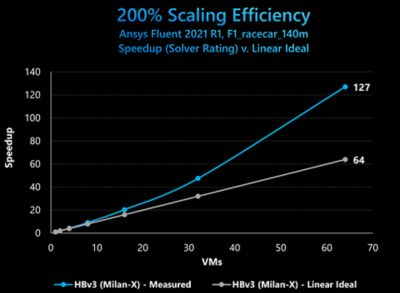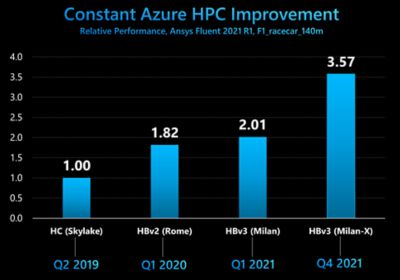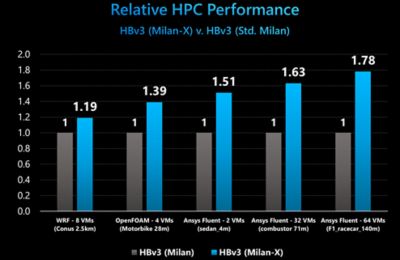ANSYS BLOG
April 15, 2022
Powering Innovation with Chip Development, Simulation, and Cloud Computing
Ansys customers have another reason to leverage Ansys’ simulation solutions in the cloud with the latest 3rd Gen AMD EPYC processors with 3D V-Cache technology.
Ansys Cloud, the managed cloud service provided by Ansys and enabled on Microsoft Azure, recently announced availability of 3rd Gen AMD EPYC processors with AMD 3D V-Cache with HBv3 virtual machines (VMs). The development unites three powerful catalysts of innovation — chip development, simulation, and cloud computing — to offer a more robust, three-layered approach to computing without on-premises hardware restrictions.
Memorable Impact and Performance
Developed chiefly to accelerate computer-aided engineering (CAE) workflows, the AMD EPYC chips use innovative 3D memory-stacking technology to produce unprecedented performance boosts. These enhancements enable up to an 80% improvement in large-scale computational fluid dynamics (CFD), such as analyses run in Ansys Fluent or Ansys CFX, and up to 50% improvement in explicit finite element analysis (FEA) crash tests like those performed in Ansys LS-DYNA. This means that Ansys Cloud customers can solve CAE simulations across various platforms much faster by making better design decisions in a shorter amount of time while saving considerably on computing costs. A recent assessment of scaling efficiency in Ansys Fluent (as shown in Figure 1) quantified a 200% improvement with AMD 3D V-Cache across 64 VMs, while generating 127 times higher performance.

Figure 1. Measured scaling efficiency from 1 to 64 VMs using Ansys Fluent 2021 R1
A Level 3 (L3) cache is already one of the fastest CPU memories available, but the latest AMD 3D V-Cache uses 3D technology to stack the cache — or memory — to bring a massive 768 MB of L3 cache per chip. With dual-socket servers, this equals 1.5 GB of L3 in each machine.
“The incredible performance boost of the HBv3 virtual machines on Microsoft Azure is unprecedented, and it is especially rewarding to see this made possible by the innovative 3D memory stacking implemented by our customer AMD,” said Shane Emswiler, senior vice president of products at Ansys. “This is truly a virtuous circle for Ansys, and it will result in our customers gaining the confidence to shift more of their simulation workloads to the cloud to reap the performance gains as soon as possible.”

Figure 2: The latest Milan-X chips are more than three times faster than 2019 Skylake chips.
Unconstrained Computing
The upcoming release has been available in the cloud a few months prior to its general release, giving cloud customers early access to the chips — and a head start on innovation.
“There is more demand than ever for high performance computing. At AMD, we continue to look at providing our partners and customers with the right processor to support the right workload, and the 3rd Gen AMD EPYC processor with AMD 3D V-cache does that for technical workloads,” said Raghu Nambiar, corporate vice president, Data Center Ecosystem and Solutions, AMD. “We are excited to work with Microsoft Azure and Ansys to create a solution that provides fantastic performance for technical workloads like CFD, FEA, and more.”

Cloud customers already benefit from receiving hardware developments and advancements without having to update their physical systems. But backed by a processor with more speed and upgraded performance, engineers, designers, and product developers will be able to explore more design alternatives and run larger simulations.
“In every industry and research community, innovation is now a compute-bound problem, which means advances in HPC are now more strategically important to Microsoft Azure customers than ever,” said Evan Burness, Principal Program Manager for HPC, Microsoft Azure. “Working closely with Ansys, we’re able to quickly bring 3rd Gen AMD EPYC processors with AMD 3D V-cache into Azure HPC virtual machine, HBv3, to the benefit of all Ansys Cloud customers. It’s an impressive combination of software tools and one of the most powerful HPC solutions available.”
As another perk, with the release of the upgraded HBv3s, the VM option will appear automatically for Ansys Cloud customers to easily select without further action needed.
For more information visit the Microsoft Azure website. To explore Ansys Cloud, register for a free trial.